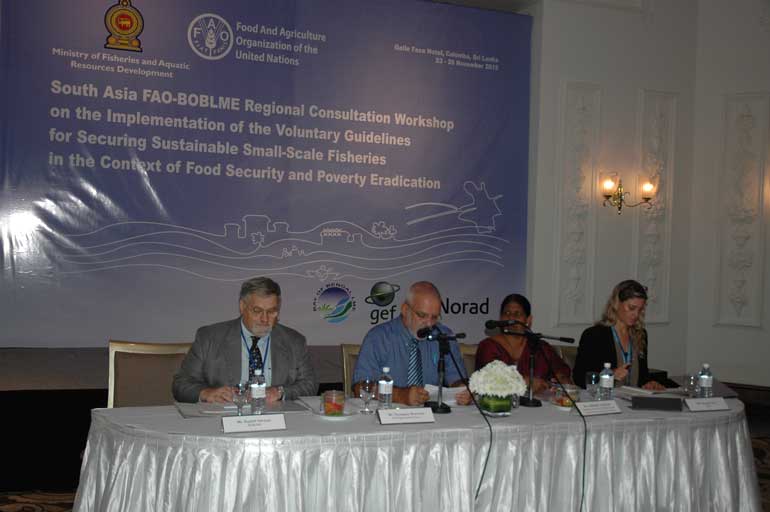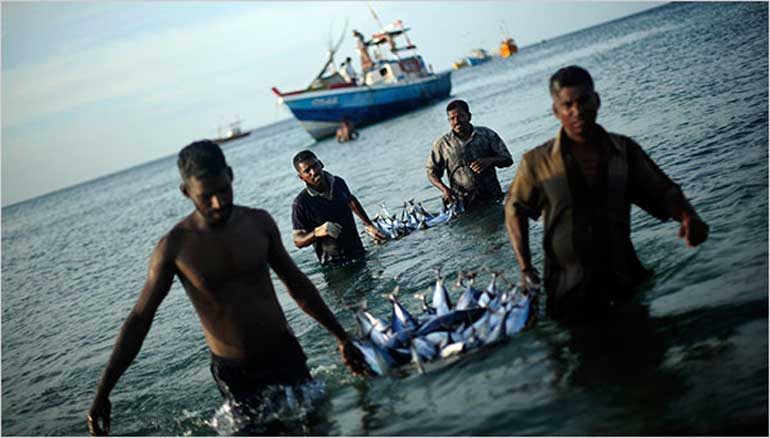Monday Feb 23, 2026
Monday Feb 23, 2026
Thursday, 3 December 2015 00:00 - - {{hitsCtrl.values.hits}}


The South Asia FAO-BOBLME Regional Consultation on the Implementation of the Voluntary Guidelines for Securing Sustainable Small-Scale Fisheries in the Context of Food Security held in Colomboon 23-26 November was organised by the Food and Agriculture Organization of the United Nations (FAO) and the Bay of Bengal Large Marine Ecosystem (BOBLME) Project for Bangladesh, India, Maldives and Sri Lanka.
It was co-hosted by the Ministry of Fisheries and Aquatic Resources Developmentof Sri Lanka, and additional financial support was provided by the Government of Norway. The workshop wasattended by 42 participants,including representatives of governments, regional and international organisations, fisher-folk organisations, civil society organisations (CSOs), NGOs, academia and other relevant actors.
The overall objective of the workshop was to raise awareness and support the development of a draft SouthEast Asian Regional Plan of Action to support the implementation of the Voluntary Guidelines for Securing Sustainable Small-Scale Fisheries in the Context of Food Security and Poverty Eradication (SSF Guidelines) in the region.
During the 3.5 days, participants examined the current status of small-scale fisheries in the region, shared experiences through country and topical presentations and discussions, and proposed action to support theimplementation of the SSF Guidelines at regional and national level.
Across the region, small-scale fisheriescontribute to livelihoods, food security, and local and regional economies. In Bangladesh, inland fisheries play a key role while marine capture fisheries dominant in the Maldives. In all four countries, the majority of fishers and fish workers are employed in the small-scale fishery sub-sector.
There are encouraging developments in the region in relation to legal reforms, strengthening participation of small-scale fisheries actors and co-management approaches. On the other hand, many challenges persist, including heavily exploited fishery resources in coastal area, competition from other sectors and insufficient institutionalisation of the ecosystem approach to fisheries in national fisheries governance frameworks.There is therefore a strong need to move from theory to practice and to link policy and actions in the spirit of the SSF Guidelines.
During the consultation, the comprehensiveness of the SSF Guidelines was acknowledged and the need to take a holistic and human rights based approach to small-scale fisheries governance and development was stressed. Efforts should be made to ensure that there is a common understanding on how to apply human rights based approach in the context of small-scale fisheries.
The workshop recognised that the implementation of the SSF Guidelines should be anchored at the local and national levels but that regional attention and support would also be required to address transboundary fisheries related issues. The contribution of the BOBLME project’s first phase to support small-scale fisheries was appreciated. The inclusion of activies in relation to the implementation of the SSF Guidelines at regional and national level in the draft Strategic Action Plan, which is the basis of the proposed second phase, was welcome.
Key priority areas of actions to be considered further in national and regional implementation planning processes proposed by the workshop included:Governance of tenure in SSF and resources management (chapter 5 of the SSF Guidelines), Social development, employment and decent work and gender equality (chapter 6+8 of the SSF Guidelines), value chains, post-harvest and trade (chapter 7 of the SSF Guidelines).
The need to identify and secure funding and synergies by all stakeholders was acknowledged. This should include engagement with international and regional development partners, including through bilateral embassies at county level, and with new projects (including BOBLME phase 2). Opportunities with NGOs operating outside fisheries and working with human rights and social development should be explored.
At national level, 2016 Budget allocations should be used to the extent possible and proposals for successive budget years should be submitted. Interaction with relevant non-fisheries ministries and departments at all levels and the mainstreaming of the SSF Guidelines in relevant policies, strategies and plans as well as public-private partnerships in support of the SSF Guidelines should be encouraged.